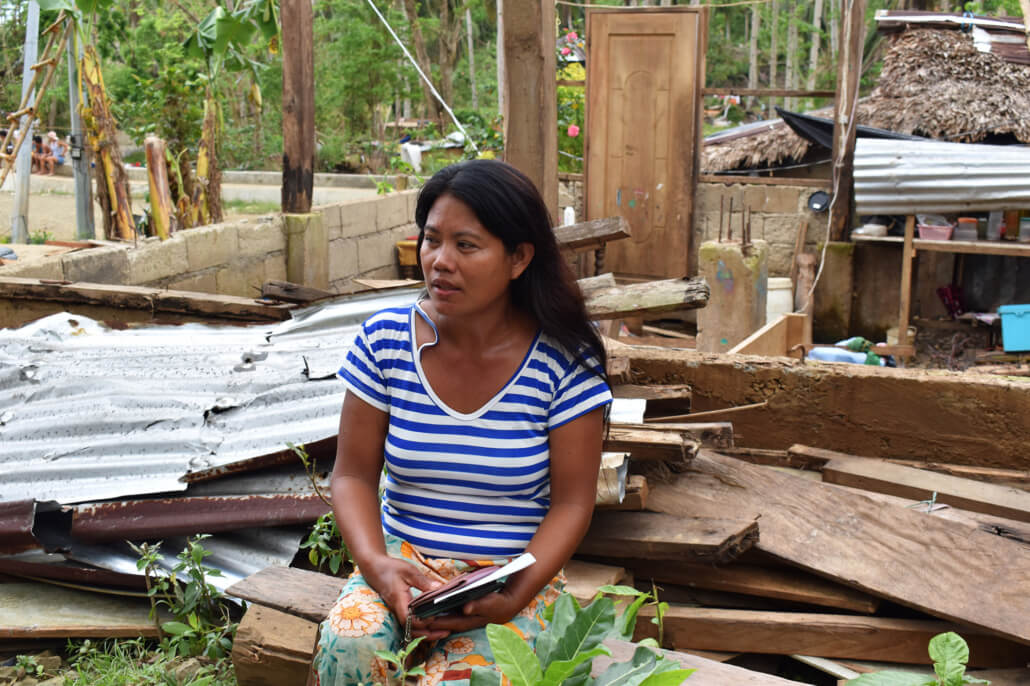Starting over after Typhoon Opong (Bualoi): Myra’s story
BALENO, MASBATE — When Typhoon Opong (international name: Bulaoi) struck Barangay Cagara in Baleno, countless families saw their lives turned upside down overnight. Among them was Myra (41), a mother of five, facing the challenge of starting over after losing nearly everything to the typhoon.
Myra is not originally from Baleno. She grew up in Quezon Province and moved to Masbate when she was 20 years old after meeting her husband through mutual friends. Three years later, they were married, and soon after, she became a mother. Over time, she built her life there—raising her children, tending to their home, and dreaming of a future where her family could live comfortably and securely.
Her husband has always been the main provider, earning a living from farming and construction work. It was never easy, but before the storm, it was enough to get by. Then came Typhoon Opong, and everything changed.
At around four in the morning, the wind grew violent. Myra remembers how the roof of their home was torn away almost instantly. “The roof was destroyed right away,” she recalls. “We ran to our neighbor’s house for shelter. We were so scared… we thought no one would help us rebuild our home.” When the storm finally passed, their house was completely destroyed, and all their belongings were soaked.
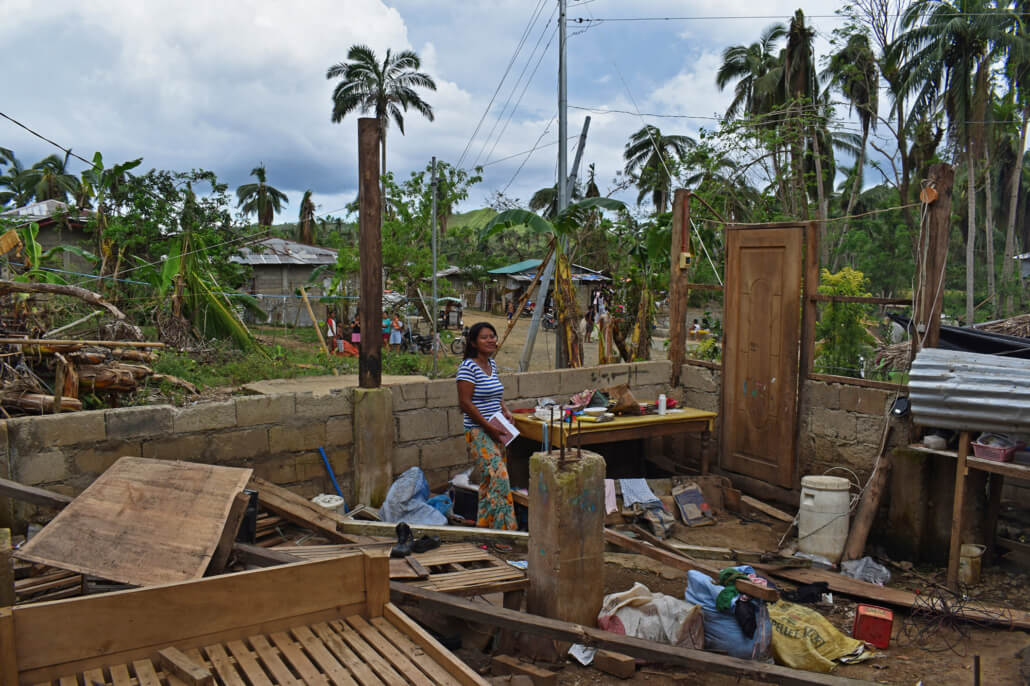
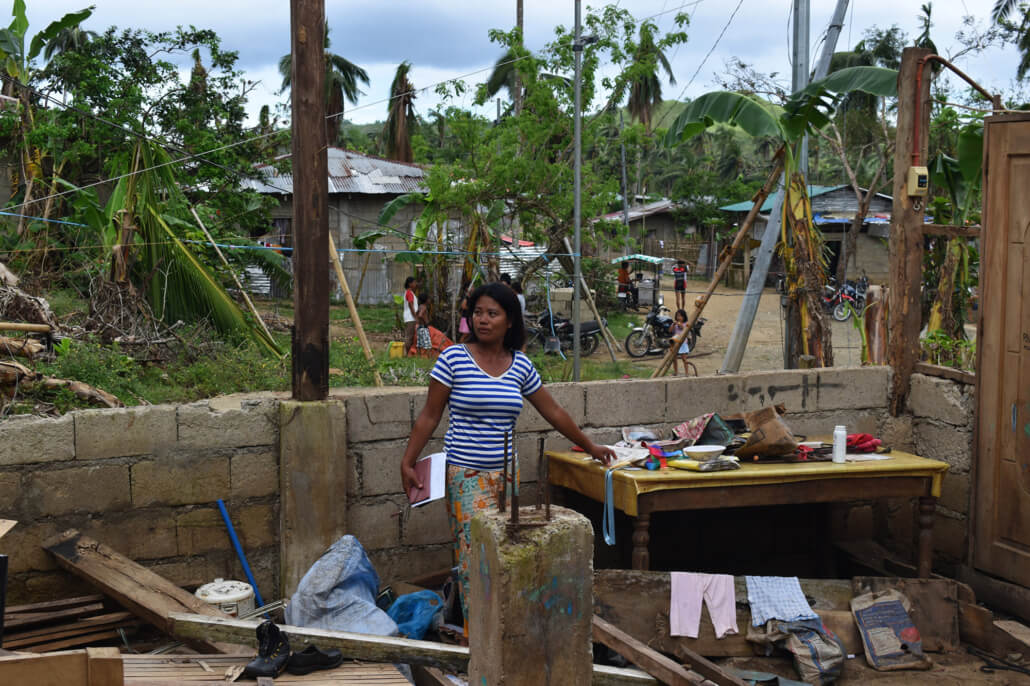
In photo: Myra walks into what remains of her house, destroyed by Typhoon Opong, in Barangay Cagara, Baleno, Masbate, and points to her soaked and ruined belongings. Photo by Martina Vercoli for Action Against Hunger.
“I want to provide for my children, but I have nothing. I’ve started to accept that when it rains, my things might get wet, because we no longer have a proper roof.” – Myra
Now, the family sleeps together in their small kitchen—the only part of the house that survived. The space is crowded with everything they own, so every night they move their belongings outside to make room for sleeping, always anxious that rain might come and drench everything again.
The typhoon didn’t just take their home; it also took away their livelihood. Her husband lost his income from both farming and construction. “Everyone in the neighborhood was affected,” Myra explains. “No one had money to pay for construction,” she adds sadly. “All the crops ready for harvest were destroyed.”
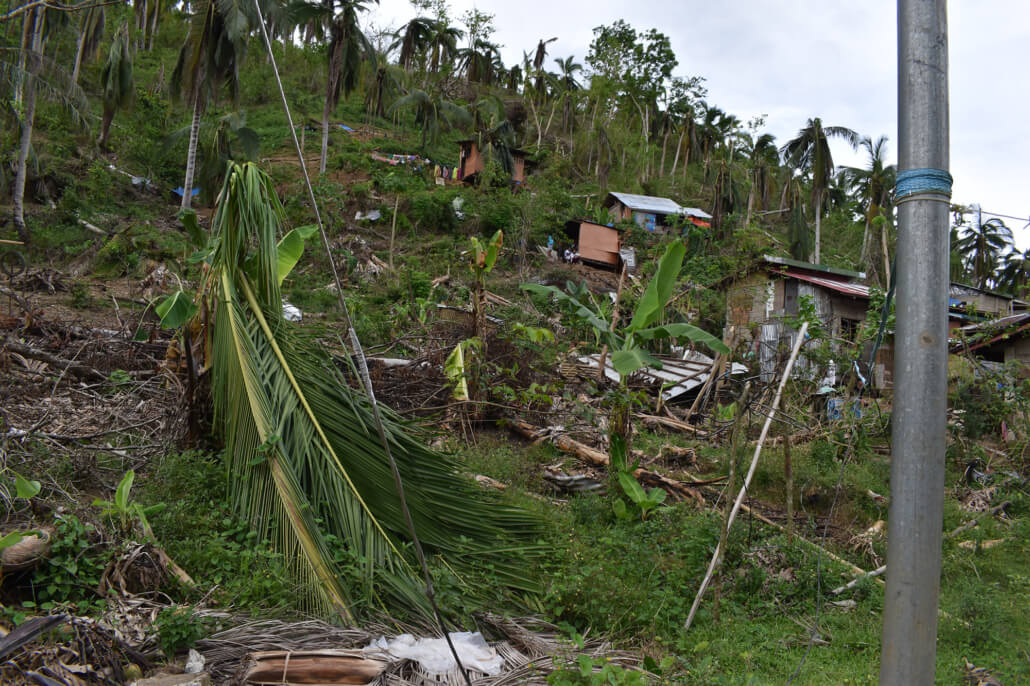
In photo: Damages in Myra’s community in the aftermath of Typhoon Opong. Photo by Martina Vercoli for Action Against Hunger.
Since then, each day has been a struggle. The family now relies on relief goods to get by. “After the typhoon, there was nothing left for us,” Myra says quietly. “Now, we rely on the relief we receive just to put food on the table.”
Before the storm, they could eat three meals a day. Now, even two are a challenge. The family uses water from a nearby faucet connected to groundwater for drinking, cooking, washing, and bathing—hoping it’s safe enough because they have no other option.
Still, Myra tries to stay strong. When she feels overwhelmed, she turns to her neighbors for comfort. “During hard times, I talk to my neighbors,” she says. “They are going through the same thing, and my children keep me motivated.”
“It’s very hard,” she admits. “I want to provide for my children, but I have nothing. I’ve started to accept that when it rains, my things might get wet, because we no longer have a proper roof.”
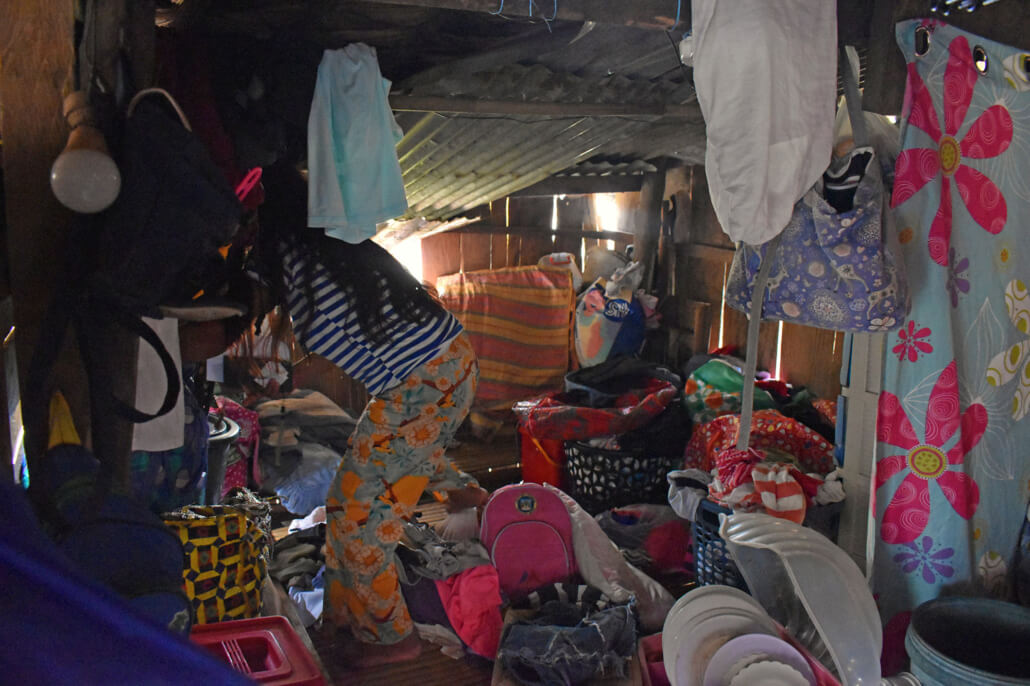
In photo: Myra Manlapas walks into her kitchen, which was separated from the main house that now serves as her family’s sleeping area after Typhoon Opong, in Barangay Cagara, Baleno, Masbate. Photo by Martina Vercoli for Action Against Hunger.
When asked if she would consider working, Myra gently shakes her head. “If I could work, I would still choose to take care of my family,” she says. “They need me here.”
Amid all the hardship, humanitarian aid has brought new hope to Myra’s family. Action Against Hunger, with funding from the Swedish International Development Cooperation Agency (SIDA), is providing cash assistance to disaster-affected communities to help families like Myra’s recover. Through this support, they were able to buy essential items and food.
The aid we received from Action Against Hunger and SIDA really helped us…We were able to buy what we needed—basic necessities and food. I’ve never received such help before.”
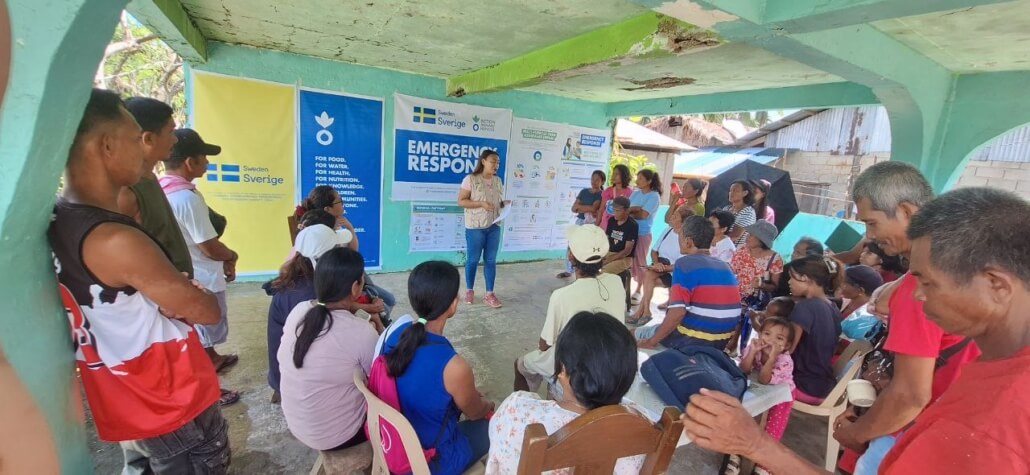
In photo: Action Against Hunger team conducts beneficiary sensitization and orientations on multi-purposes cash assistance with the community.
“The aid we received from Action Against Hunger and SIDA really helped us,” Myra shares with gratitude. “We were able to buy what we needed—basic necessities and food. I’ve never received such help before.” Part of the assistance will also go toward rebuilding their destroyed house, giving them the chance to start anew.
Even in the face of loss and uncertainty—common to those affected by natural disasters—Myra’s story is one of quiet strength and enduring hope. It shows that with timely assistance, families like hers can begin to rebuild their lives and recover what they have lost.
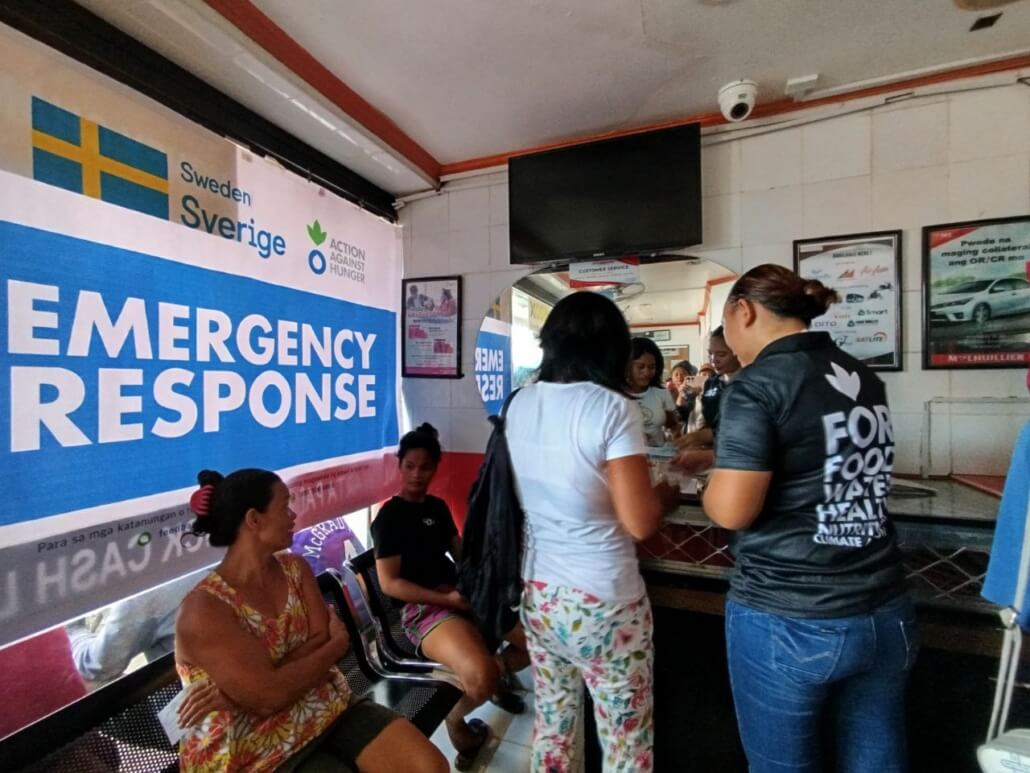
In photo: Recipients of the cash assistance during the multi-purpose cash assistance payout in Baleno.
According to the latest government data, Typhoon Opong affected over 163,000 families (around 664,000 individuals) across Masbate Province, damaging more than 106,000 houses, including over 21,000 totally destroyed. The hardest-hit municipalities include Masbate City, Aroroy, Cawayan, Mobo, and Baleno.
With support from funding agencies including the Swedish International Development Cooperation Agency (SIDA), Action Against Hunger continues to assist the most affected families in Masbate by providing food and multi-purpose cash assistance, safe water access, hygiene kits, and support for early recovery and livelihood restoration—helping communities rebuild their lives after the devastating impact of Typhoon Opong.
Written by Martina Vercoli.


